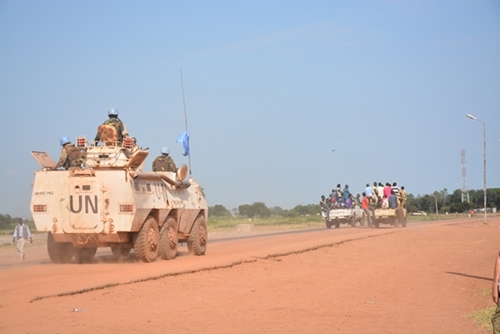Every week, U.N. military observers carry out from two to five short patrol sessions, which usually last for one day. Sometimes they also conduct longer ones, probably lasting for about 10 days or even one month.
    |
 |
|
UN peacekeepers patrolling along a road in Bentiu |
Apart from patrolling, U.N. military observers also undertake other missions such as connecting the Government’s forces and different armed groups to arrange meetings, inspecting ceasefire implementation, or joining negotiations for favorable conditions for the traveling of all forces and local people, and more.
One patrol of the U.N. military observers in Bentiu in 2019 started at 0815 hours under the protection of 18 Ghana troops assigned to four vehicles, including one armored personnel carrier which led the patrolling mission. Major Trinh Van Cuong, a U.N. military observer of Vietnam, checked the troop strength of the patrol mission and then reported to the command post via his walkie-talkie.
As the mission left the base, it met several armored carriers of the Mongolian protection force. Felix Zirunguye, a U.N. military observer of Rwanda, revealed that members of the Mongolian and Ghanaian protection units account for more than half of the troop strength of the U.N. in Bentiu (about 1,600 troops in total). They are also the most elite units there.
The patrol mission was now heading to Nhialdiu. Felix Zirunguye was a good driver, as it was hard to drive on the rocky roads from Bentiu to Nhialdiu. In fact, almost all roads in South Sudan are in similar conditions. They are all dirt roads and it is hard to move along, as in the dry season the roads are all covered in dust while in the rainy season, they turn swampy.
The first site of the patrol was the headquarters of an army company of the Government’s defense force (the South Sudanese People’s Defense Force - SSPDF). Captain Gatchang Kuon, the officer commanding of the army unit, and a few soldiers welcomed the patrol mission. He quickly provided information at the request of the U.N. military observers. Accordingly, the area was basically peaceful and people could move freely while food, medicines, and other supplies were sufficiently provided. However, the water tank in the area was damaged and needed repairing so that local people could have water for daily use.
Leaving the SSPDF company, the patrol mission headed for the headquarters of the Nhialdiu government, which was not far away. Dak Manyguek, lieutenant governor of the Nhialdiu government, reported that the situation in the area was generally stable despite a few minor law violation cases that worried local people. Then, without looking at the log, he listed in details incidents that occurred recently, including a theft of 23 cows, another of 15 cows, and SSP 15,000 (about USD 50)… Major Trinh Van Cuong and the other two U.N. military observers took notes attentively.
The patrol session ended at 1400 hours the same day.
On the way back to the base, through the dirt-smeared windshield, one can see the Tukun thatched houses of the South Sudanese people, rusty pick-up trucks lying motionlessly on the sides of the road, abandoned factories amid the weeds high up to one’s ears... They are the evidence of a land torn by conflicts. The patrol session has helped people further understand the duties that U.N. peacekeepers, including Vietnamese U.N. peacekeepers, are undertaking and the true value of peace.
Translated by Huu Duong
Part 3: Emergency operations